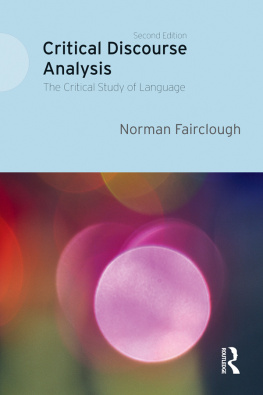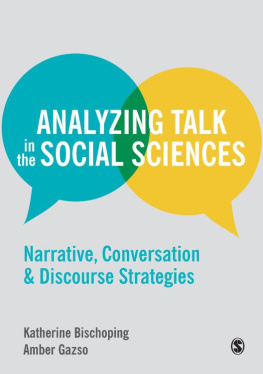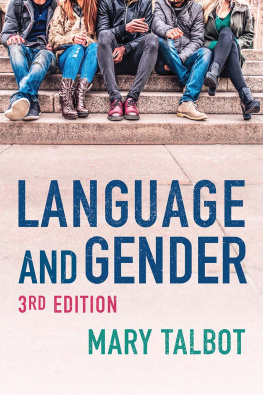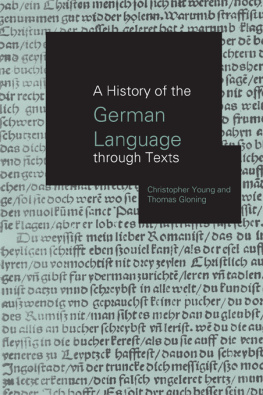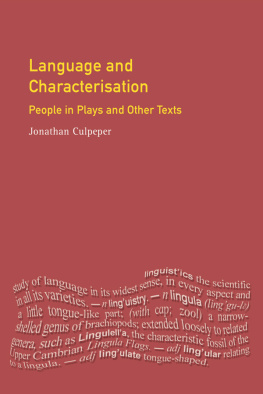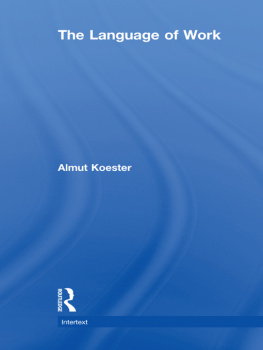Analysing Discourse
'This is an important text which highlights not only why discourse analysis should be a central method within social science but, unusually, provides the resources necessary for putting this into practice. The book will be an inspiration for social scientists wishing to explore, in a sophisticated way, the importance of language and meaning making in social life.'
Annette Hastings, Department of Urban Studies, University of Glasgow, UK
'Covers a wide range of important contemporary concepts in social and political theory taken from many different sources and disciplines. I would certainly recommend it to other researchers in the field as a thought-provoking contribution to critical discourse analysis.'
Ulrike Meinhof, School of Modern Languages, University of Southampton, UK
Analysing Discourse is an accessible introduction to text and discourse analysis for all students and researchers working with real language data.
Students across disciplines rely on texts, conversations or interviews in their research. Many discover that they cannot get as much from this data as they would like, because they are unsure about exactly how to analyse their material. This book provides a step-by-step guide to using and investigating real language data, helping students and researchers to get the most out of their resources.
Drawing on a range of social theorists from Bourdieu to Habermas, as well as his own research, Fairclough's book presents a form of language analysis with a consistently social perspective. His approach is illustrated by and investigated through a range of real texts, from political speeches to management consultancy and broadcast news reports.
Offering accessible summaries, an appendix of examples and a glossary of terms and key theorists, Analysing Discourse is an essential resource for anyone using and investigating real language data.
Norman Fairclough is Professor of Language in Social Life at Lancaster University, UK. He has published seven books in the area of critical discourse analysis, including New Labour, New Language? (Routledge, 2000), Critical Discourse Analysis (1995) and Language and Power (second edition, 2001).
Analysing Discourse
Textual analysis for social research
Norman Fairclough
LONDONANDNEW YORK
First published 2003
by Routledge
11 New Fetter Lane, London EC4P 4EE
Simultaneously published in the USA and Canada
by Routledge
29 West 35th Street, New York, NY 10001
Routledge is an imprint of the Taylor & Francis Group
This edition published in the Taylor & Francis e-Library, 2004.
2003 Norman Fairclough
All rights reserved. No part of this book may be reprinted or reproduced
or utilised in any form or by any electronic, mechanical, or other means,
now known or hereafter invented, including photocopying and recording,
or in any information storage or retrieval system, without permission in
writing from the publishers.
British Library Cataloguing in Publication Data
A catalogue record for this book is available from the British Library
Library of Congress Cataloging in Publication Data
A catalog record for this book has been requested
ISBN 0-203-69707-3 Master e-book ISBN
ISBN 0-203-69752-9 (MP PDA Format)
ISBN 0-415-25892-8 (hbk)
ISBN 0-415-25893-6 (pbk)
Copyright 2003/2004 . All rights reserved.
Reader's Guide
This ebook has been optimized for PDA.
Tables may have been presented to accommodate this Device's Limitations.
Table content may have been removed due to this Device's Limitations.
Image presentation is limited by this Device's Screen resolution.
All possible language characters have been included within the Font handling ability of this Device.
Contents
Acknowledgements
The publishers and editors would like to thank the following people and organizations for permission to reproduce copyright material:
BBC Radio 4 news broadcast 'Extradition of Two Libyans', 30 September 1993, reprinted by permission of BBC Radio 4; M. Barratt Brown and K. Coates, The Blair Revelation (Spokesman Books, 1996); Department for Education and Employment, The Learning Age (HMSO, 1998), pages 910; R. Iedema, 'Formalizing organizational meaning' Discourse and Society(1), reprinted by permission of Sage Publications Ltd. Copyright Sage Publications Ltd, 1999; Independent Television, Channel 3, 'Debate on the Future of the Monarchy', January 1997, reprinted by permission of Independent Television; Rosabeth Moss Kanter, Evolve! (Harvard Business School Press, 2001, reprinted by permission of Harvard Business School); P. Muntigl, G. Weiss and R. Wodak, European Union Discourses on Un/employment (John Benjamins, 2000), page 101; R. Sennett, The Corrosion of Character (W.W. Norton Inc., 1998); T.J. Watson, In Search of Management: Culture, Chaos and Control in Managerial Work (Routledge, 1994); World Economic Forum Annual Meeting, 'Globalization', January 2002, Davos, Switzerland.
While every effort has been made to contact copyright holders of material used in this volume, the publishers would be happy to hear from any we have been unable to contact, and we will make the necessary amendment at the earliest opportunity.
I am grateful to MA and Research students at Lancaster University and to members of the Language, Ideology and Power Research Group for responses to and comments on early versions of parts of the book. I am also grateful to Jim Gee, Annette Hastings and Bob Jessop for valuable comments on a draft of the whole manuscript which have been helpful in making revisions.
I want to thank Matthew and Simon for their long-suffering fortitude in the face of another of Daddy's interminable books. And Isabela, for meaning.
Introduction
This book is written with two main types of reader in mind: students and researchers in social science and humanities who have little if any background in language analysis (e.g. in Sociology, Political Science, Education, Geography, History, Social Administration, Media Studies, Cultural Studies, Women's Studies); and students and researchers specializing in language.
People working in various areas of social science are often confronted with questions about language, and are often working with language materials written texts, or conversation, or research interviews. However, my experience in teaching discourse analysis (for instance in the Faculty of Social Science research training programme at Lancaster University) indicates that there is widespread uncertainty about how to analyse such language material. I find that research students in Social Sciences often see the need to say more detailed things about their language data than they feel equipped to do. The prospect of following courses or reading books in Linguistics is generally daunting to them not least because much of contemporary Linguistics is quite unsuitable for their purposes (especially the 'formal linguistics' which is concerned with abstract properties of human language, and has little to offer in the analysis of what people say or write). This book aims to provide a useable framework for analysing spoken or written language for people in social sciences and humanities with little or no background in language study, presented in a way which suggests how language analysis may enhance research into a number of issues which concern social scientists.
Next page

